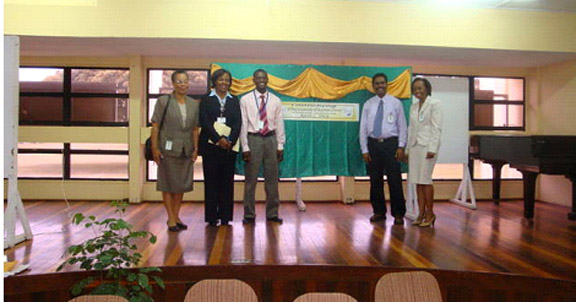The University of Guyana yesterday launched its Online Library Service at the Turkeyen Campus to facilitate online access to over 65,000 books for students, staff and members of the public, while access to another 120,000 is expected soon.
A similar programme was launched at the Tain Campus in Berbice last year, where the Online Public Access Catalog (OPAC) service was unveiled as a pilot project for the university’s library services.
According to the Manager of the Department of Software Engineering, Sekhar Mallampati, the service is one of a kind, since the University of Guyana Library is the first library in the Caribbean to implement Koha. (Koha is the first free and open source software library automation package Integrated Library System [ILS]. Development is sponsored by libraries of varying types and sizes, volunteers, and support companies from around the world.)

Mallampati further noted that one of the most important benefits of the software is that it is a free open source software that can aid in the university’s development given its financial status. Other benefits, according to him, include easier access to books by students, access to books from anywhere in the country and unlimited access to books after the library has closed.
He also pointed out that the UG Library can also be informed about books students are looking for when they search for books online. Book names that are not available on the site but are often researched by students can then be mailed to donors, which can aid in meeting the demands of students.
The service costs about US$200 per month to maintain at both campuses and is powered by Koha.
However, online libraries can be maintained from as low as US$4 depending on the server size. The service will allow students to reserve books, see books that are available to borrow, and see how many copies of the book are available in the library at both Tain and at the Turkeyen Campus. Access to other academic sites such as Jstor and Ebscohost is also made available with the service.
The flip side about the service is that students will have to manually go to the respective libraries to uplift the books needed, Mallampati noted.
Librarian, Gwyneth George, noted that “all of the features of the software have not been fully activated since the project is still in progress with the continuation of data entry into the system”. She further stated that the transition from manual to technological is still ongoing and students will still have to interact with library staff until the manual aspect is phased out.
Students can access the service by simply logging on to the university’s website with their username and password. They can then click on the library icon and access the various features available at the site. Members of the public will have limited access to some of the features and will require a user name and password to reserve a book.
Students will also receive emails with information pertaining to the Online Library service, and provisions are in place at the library to assist students in using the service.
The service also has the feature to inform students about the due date of books, and when new books are added to the catalogue. These features will be implemented within a few months, Mallampati said.
Vice Chancellor (ag) Dr Marlene Cox said that the accomplishment is a journey that still continues. She said “all books are not placed online as yet since the work is manual and tedious’’. She also encouraged persons to make use of the service that is available.




